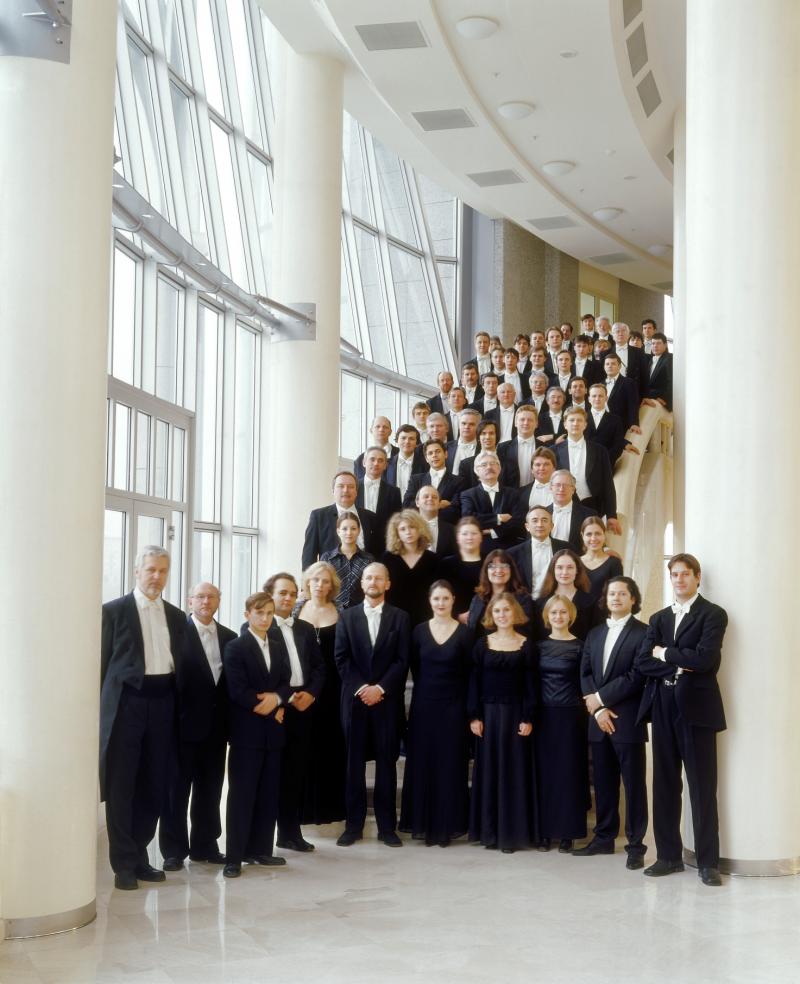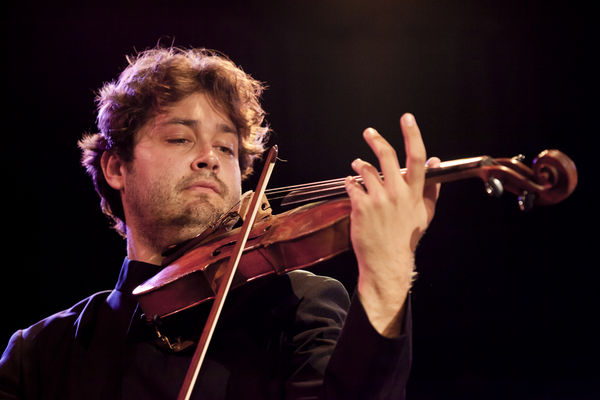War and Peace: Russian National Orchestra, LPO, Jurowski, Royal Festival Hall | reviews, news & interviews
War and Peace: Russian National Orchestra, LPO, Jurowski, Royal Festival Hall
War and Peace: Russian National Orchestra, LPO, Jurowski, Royal Festival Hall
Hybrid orchestra of Russian and British players pulls Shostakovich's sprawling Leningrad Symphony together

Can two half-orchestras playing together ever be better than one well-established organism? The second and third concerts in yet another special project masterminded by Vladimir Jurowski, drawing together British and Russian perspectives on war and peace, proved that they could. It may have been disappointing to find the Russian National Orchestra on Thursday evening launching so cold-bloodedly into the feral start of Vaughan Williams’s Sixth Symphony.
The RNO certainly has its star players – principal oboist Olga Tomilova and flautist Maxim Rubtsov among them – and even though its seven double-basses were to be impressively augmented to the tune of 12 in the hybrid spectacular, their underpinning in both the Vaughan Williams and Prokofiev’s Fifth Symphony had terrific resonance. The problem, it has always seemed to me, rests with some unfocused brass playing and the Russian violin section, oddly invertebrate.
We were made to believe in the undertow of struggle that never slackened for a second
Set alongside the incisive brilliance Jukka-Pekka Saraste had drawn from the BBC Symphony Orchestra in Wednesday night’s Shostakovich Fourth, the impression made by VW's usually shattering symphony was disappointingly neutral. Jurowski negotiated the phrasing and the climaxes with well-sprung mastery, but it was hard to feel the composer's concentrated pain. Only the distant voices of divided or meandering strings functioned at a deeper level - which is quite something in Vaughan Williams’s inconsolable wraith of an epilogue, though in this case not entirely justified by what had gone before. Had the outlines been more forceful, VW’s eloquence would have merited the spotlight of the second half – a place occupied by the well-manouevred but rather overbearing Prokofiev. Full marks, anyway, to a highly artistic woodblock player.
The superband effect on Friday night included the luxury of two tubas, their presence felt in the well-tempered conflict of Tchaikovsky’s 1812 Overture and the siren wails of Shostakovich’s brass as the banal little tune of war accompanied, Bolero like, by a consummately handled side-drum, forged mechanically ahead (a ringtone counterpoint at the all-too quiet start of the juggernaut made its own commentary). Humanity was mostly to be found in a chain of outstanding woodwind solos shared with evident warmth between LPO and RNO principals.
 There were two commemorations being made here: 200 years since the Battle of Borodino and 70 since the Siege of Leningrad brought about the birth of Shostakovich’s forthright symphony for the people. Canny links to make, certainly, but both pieces truly came to life without the weight of circumstance hanging heavy on them, as can so often be the case. It’s easy to forget that Tchaikovsky starts with a string sextet privately voicing a public native chant, "Save us, o Lord". All the action that follows can seem like a patchwork of themes, but not under Jurowski’s elegant guidance. Even the final cannonading had bounce and spring.
There were two commemorations being made here: 200 years since the Battle of Borodino and 70 since the Siege of Leningrad brought about the birth of Shostakovich’s forthright symphony for the people. Canny links to make, certainly, but both pieces truly came to life without the weight of circumstance hanging heavy on them, as can so often be the case. It’s easy to forget that Tchaikovsky starts with a string sextet privately voicing a public native chant, "Save us, o Lord". All the action that follows can seem like a patchwork of themes, but not under Jurowski’s elegant guidance. Even the final cannonading had bounce and spring.
Jurowski’s biggest challenge in the Shostakovich was always going to be the climactic drive towards a more ambiguous victory. The whole of the last movement needs a triumph of manner over Shostakovich’s less than inspired matter; in a performance of surpassing shapeliness and conviction, we were made to believe in the undertow of struggle that never slackened for a second. The final burst into processional flames, with the 30-plus violins magnificently ranged left and right of the conductor and brass keeping their collective head, worked its blatant charm as it only really can in a great concert-hall occasion. This was certainly such an event.
Just as special, in its understated way, and a masterstroke of programming, was the central dialogue between peerless viola-player Lawrence Power (pictured above right by Nicolas Brodard) and much-reduced strings in Britten’s Lachrymae – viewing Dowland’s “If My Complaint Could Passions Move” first through a glass darkly and then, right at the end, face to face with touching simplicity. Power's and his orchestral colleagues’ fine balance between projection and introspection was as much of a miracle, albeit on a poignantly small scale, as anything in a totally satisfying evening of committed musicianship.
rating
Share this article
The future of Arts Journalism
You can stop theartsdesk.com closing!
We urgently need financing to survive. Our fundraising drive has thus far raised £49,000 but we need to reach £100,000 or we will be forced to close. Please contribute here: https://gofund.me/c3f6033d
And if you can forward this information to anyone who might assist, we’d be grateful.

Subscribe to theartsdesk.com
Thank you for continuing to read our work on theartsdesk.com. For unlimited access to every article in its entirety, including our archive of more than 15,000 pieces, we're asking for £5 per month or £40 per year. We feel it's a very good deal, and hope you do too.
To take a subscription now simply click here.
And if you're looking for that extra gift for a friend or family member, why not treat them to a theartsdesk.com gift subscription?
more Classical music
 Kempf, Brno Philharmonic, Davies, Bridgewater Hall, Manchester review - European tradition meets American jazz
Bouncing Czechs enjoy their Gershwin and Brubeck alongside Janáček and Dvořák
Kempf, Brno Philharmonic, Davies, Bridgewater Hall, Manchester review - European tradition meets American jazz
Bouncing Czechs enjoy their Gershwin and Brubeck alongside Janáček and Dvořák
 Solomon, OAE, Butt, QEH review - daft Biblical whitewashing with great choruses
Even a top soprano and mezzo can’t make this Handel paean wholly convincing
Solomon, OAE, Butt, QEH review - daft Biblical whitewashing with great choruses
Even a top soprano and mezzo can’t make this Handel paean wholly convincing
 Two-Piano Gala, Kings Place review - shining constellations
London Piano Festival curators and illustrious friends entertain and enlighten
Two-Piano Gala, Kings Place review - shining constellations
London Piano Festival curators and illustrious friends entertain and enlighten
 Echo Vocal Ensemble, Latto, Union Chapel review - eclectic choral programme garlanded with dance
Beautiful singing at the heart of an imaginative and stylistically varied concert
Echo Vocal Ensemble, Latto, Union Chapel review - eclectic choral programme garlanded with dance
Beautiful singing at the heart of an imaginative and stylistically varied concert
 Scott, Irish Baroque Orchestra, Whelan, RIAM, Dublin review - towards a Mozart masterpiece
Characteristic joy and enlightenment from this team, but a valveless horn brings problems
Scott, Irish Baroque Orchestra, Whelan, RIAM, Dublin review - towards a Mozart masterpiece
Characteristic joy and enlightenment from this team, but a valveless horn brings problems
 Classical CDs: Voice flutes, flugelhorns and froth
Baroque sonatas, English orchestral music and an emotionally-charged vocal recital
Classical CDs: Voice flutes, flugelhorns and froth
Baroque sonatas, English orchestral music and an emotionally-charged vocal recital
 Kanneh-Mason, Britten Sinfonia, Shave, Milton Court - a grin and a big beaming smile
A pair of striking contemporary pieces alongside two old favourites
Kanneh-Mason, Britten Sinfonia, Shave, Milton Court - a grin and a big beaming smile
A pair of striking contemporary pieces alongside two old favourites
 theartsdesk at the New Ross Piano Festival - Finghin Collins’ musical rainbow
From revelatory Bach played with astounding maturity by a 22 year old to four-hand jazz
theartsdesk at the New Ross Piano Festival - Finghin Collins’ musical rainbow
From revelatory Bach played with astounding maturity by a 22 year old to four-hand jazz
 First Person: Manchester Camerata's Head of Artistic Planning Clara Marshall Cawley on questioning the status quo
Five days of free events with all sorts of audiences around Manchester starts tomorrow
First Person: Manchester Camerata's Head of Artistic Planning Clara Marshall Cawley on questioning the status quo
Five days of free events with all sorts of audiences around Manchester starts tomorrow
 Goldscheider, Brother Tree Sound, Kings Place review - music of hope from a young composer
Unusual combination of horn, strings and electronics makes for some intriguing listening
Goldscheider, Brother Tree Sound, Kings Place review - music of hope from a young composer
Unusual combination of horn, strings and electronics makes for some intriguing listening

Add comment